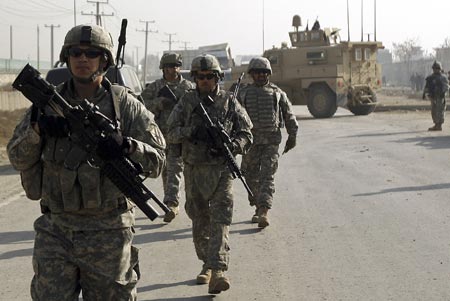Obama to send 30,000 more troops to Afghanistan
After months of review, the Obama administration on Tuesday renewed its strategy for Afghanistan by sending 30,000 additional troops to the country in a decisive war against the al-Qaida network and extremists.
 |
|
U.S. troops patrol the area after a suicide car bomb attack in Kabul November 13, 2009. A suicide car bomber struck a convoy of civilian vehicles outside a U.S. military base in Kabul early on Friday, wounding three Afghans and causing several casualties among foreigners, police said. [Xinhua/Reuters File photo] |
"As Commander-in-Chief, I have determined that it is in our vital national interest to send additional 30,000 U.S. troops to Afghanistan. After 18 months, our troops will begin to come home," said President Barack Obama, who told his people "Afghanistan is not lost."
Three ways
Speaking at the U.S. Military Academy in West Point on Tuesday night, President Obama reiterated the overarching goal of the new strategy remains the same as the March-Version strategy: to disrupt, dismantle, and defeat al-Qaida in Afghanistan and Pakistan, and to prevent its capacity to threaten the United States and its allies in the future.
Under the strategy, the United States must deny al-Qaida a safe-haven. "We must reverse the Taliban's momentum and deny it the ability to overthrow the government. We must strengthen the capacity of Afghanistan's Security Forces and government, so that they can take lead responsibility for Afghanistan's future," said Obama.
The president specified three ways to meet these objectives: pursuing a military strategy that will break the Taliban's momentum and increase Afghanistan's capacity over the next 18 months; pursuing a more effective civilian strategy that the Afghan government can take advantage of improved security; and strengthening effective partnership with Pakistan.
Military supplement
Sending more troops is one of key elements for the military strategy. Obama said he has made the decision because he is convinced that U.S. security is at stake in Afghanistan and Pakistan. "This is the epicenter of the violent extremism practiced by al-Qaida."
Another key element is the transfer of security responsibility from U.S. troops to Afghans.
"It will be clear to the Afghan government, and more importantly, to the Afghan people, that they will ultimately be responsible for their own country," said Obama, who told Americans the U.S. troops will begin to withdraw from Afghanistan in July of 2011.
The president also called on all U.S. allies, especially members of the North Atlantic Treaty Organization (NATO) to offer their firm support to U.S.-led mission in Afghanistan, saying the war "is not simply a test of NATO's credibility," but "the common security of the world."
Civilian support
On the civilian strategy, Obama set a precondition on U.S. assistance for the Afghan government led by President Hamid Karzai.
Critics, including U.S. Ambassador to Afghanistan Karl Eikenberry, have warned that sending more troops to Afghanistan would be a waste of American lives and money and would boost Kabul's reliance on U.S. troops unless Karzai can really improve ability to tackle his government's corruption and mismanagement.
"This effort must be based on performance. The days of providing a blank check are over ... We will be clear about what we expect from those who receive our assistance," said Obama.
"We will support Afghan ministries, governors and local leaders that combat corruption and deliver for the people. We expect those who are ineffective or corrupt to be held accountable. And we will also focus our assistance on areas that can make an immediate impact on the lives of the Afghan people," he specified.
The Obama administration believes that economic growth, stimulated by a civilian-military agriculture redevelopment strategy, would be critical to undermine extremists' appeal in the short term and for sustainable economic development in the long term.
Inextricable Pakistan
"We will act with the full recognition that our success in Afghanistan is inextricably linked to our partnership with Pakistan," said Obama.
According to President Obama, the United States will continue to encourage civilian and military leadership to sustain fight against extremists and to eliminate terrorists' safe havens in the country.
"We are in Afghanistan to prevent a cancer from once again spreading through that country. But this same cancer has also taken root in the border region of Pakistan. That is why we need a strategy that works on both sides of the border," said Obama.
The United States has reaffirmed its commitment to Islamabad by helping Pakistan address immediate energy, water, and related economic crises, to supporting broader economic reforms that are necessary to put the country on a path toward sustainable economic growth, and to helping it build on its success against militants to eliminate extremist sanctuaries.
In his first speech on strategy for Afghanistan in March, President Obama ordered to send 21,000 additional troops to the country to disrupt, dismantle and defeat al-Qaida in Afghanistan and Pakistan. However, as the situation in Afghanistan deteriorates, Stanley McChrystal, the top U.S. commander in Afghanistan, has been calling for 40,000 more troops since August to quell the insurgency led by Taliban.
The announced military supplement will bring the number of U.S. troops in Afghanistan to nearly 100,000.
Mike Mullen, chairman of Joint Chiefs of Staff, on Tuesday told reporters that military leaders "fully and unhesitatingly" support Obama's decision on the strategy for Afghanistan, adding that the supplement would offer McChrystal the forces he needs to execute the strategy.
"We are all confident in that, and I'm actually confident that we can succeed at this endeavor," said Mullen.
 0 Comments
0 Comments







Comments